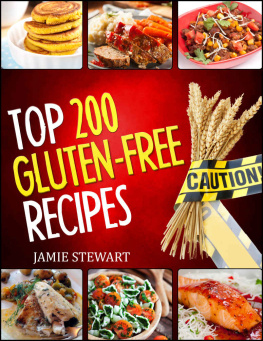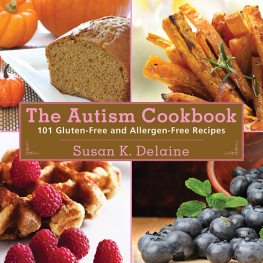THE KID-FRIENDLY
ADHD &
AUTISM
COOKBOOK
THE ULTIMATE GUIDE TO THE GLUTEN-FREE, MILK-FREE DIET
Pamela J. Compart, M.D. and Dana Laake, R.D.H., M.S., L.D.N.
Foreword by Jon B. Pangborn, Ph.D., F.A.I.C. and Sidney MacDonald Baker, M.D.

This book is dedicated to all the courageous
children and to all who love and serve them.
We are humbled in your presence.
Preface
When I went to medical school over twenty years ago, nutrition was given very little attention. While I attended a very open-minded, cutting-edge school, my nutrition training consisted of one week of lectures. This left my colleagues and me with the impression that, at the time, nutrition was not felt to be very relevant to the practice of medicine. As I proceeded through my traditional training, not much happened to dispel that notion. It was only after I completed my formal training and began practicing in the real world of developmental pediatrics that I realized how critically important nutrition is to overall health and, in particular, to brain functioning.
Early on in my training, when parents would ask me if they should try special diets or nutritional supplements for their special-needs children, I distinctly remember advising them not to waste their time, as there was no evidence to show that they helped. I wish now that I could find all those parents and tell them they were right to be thinking outside the box. Parents have always been motivated to look at all options to help their children, especially those with special needs. It is only now that science is catching up with what those parents asked many years ago. Part of the role of this book is to explain the science behind the diets and why these diets may be worth trying with your child.
I am grateful that I came to an understanding of nutrition via a traditional medical route. I was not at all predisposed to believing that diets would help change behavior, development, and brain function. So when I saw diets working, I knew it was not a placebo effect. Still, I wanted to know why they worked and have now devoted my medical practice to understanding these nontraditional approaches. My traditional training also reminds me that there is no one way to treat children with special needs. Many people in both camps (traditional and nontraditional) assume that the type of intervention they favor is the right one. I believe strongly in using all the tools I have at my disposal to help children reach their potential, whether those tools are traditional (therapy, school placement, medications, etc.) or nontraditional (diet change, nutritional supplements, digestive support, etc.). This book addresses some of these less traditional tools, specifically diet and nutrition.
Dr. Sidney Baker, in his book Detoxification and Healing, outlines a helpful context for thinking about the role of diet in brain function. In essence, he asks two basic questions that, for me, form the basic foundation of my approach to caring for children with special needs. Paraphrased here, these two questions are:
Is this childs body and brain getting all that is needed to perform optimally?
Is there something getting to this childs brain that interferes with its ability to perform optimally?
Diet and nutrition are clearly involved in answering both of these questions. An optimized diet, along with nutritional supplements, provides nutrients that are essential for body and brain functioning. In addition, breakdown products from certain foods (particularly dairy and glutens) can interfere with brain functioning. These concepts will be explained further in the chapters that follow. The recipes in this book are designed to give the body and brain what is needed, and to eliminate those substances that are most likely to interfere with function.
In medicine, there is a saying that you dont have to remember everything, you just have to remember where you filed the article. In the same way, I dont have to know everything about nutrition; I have to know who my good resources are to complement my medical knowledge of health and nutrition; Dana Laake, my coauthor, is such a resource.
Pamela J. Compart, M.D.
My introduction to nutrition began through a career in dentistry. I learned the powerful effects of food on the body and mind from Emanuel Cheraskin, a physician and dentist, who was an internationally renowned researcher and expert in the field of nutritional medicine, dental health, and the role of vitamins and minerals in health and disease. While attending a course led by this pioneer, who would influence my career for the next 25 years, I fell in love with the fields of nutrition and preventive medicine. Cheraskin opened the first of many doors in this challenging and rapidly evolving field. His legacy was great, but I remember him most for the simplicity of his favorite statement, Man is a food-dependent creature; if you dont feed him he will die. If you feed him improperly, a part of him will die.
In 1979, George Mitchell, our family physician, invited me to join him in opening a preventive medicine practice in Washington, D.C. Dr. Mitchell provided me the opportunity of traveling throughout the country to learn from the innovators and visionaries in nutrition and alternative medicine.
My first special child presented early on in the practice, when a distraught mother brought her seven-year-old son for evaluation and treatment. He was a conundrum to his family, teachers, and physicians. Beginning at two years of age, problem behaviors had developed. He eventually became physically violent toward others, including routinely striking his father. He was unable to function in school because of poor attention span, impulsivity, acting out, and aggression. He had chronic bowel problems, wet his bed nightly, and was in a constant state of agitation and unhappiness. Showing the reports from his teachers, his mother cried as she confessed, Each teacher tells me that he is the worst child they have ever encountered.
A review of his diet revealed that milk products and glutens (wheat) were his most common and favorite foods. This occurred in the era when there was little acceptance of the connection between food and behavior. In fact, to suggest this relationship was considered medical quackery. I had only read about the results of removing milk products and gluten from diets to achieve improvement in behavior and functionI had not yet experienced it with a patient. We did not have the quality and accuracy of testing so prevalent today, but the anecdotal evidence was abundant. Since a trial of food avoidance fits the medical dictum, Do no harm, I recommended a trial of strict avoidance of milk products and gluten.
The results elated me as much as the parents. After the first few days withouth milk products and gluten, the boy became worse. But within a week of avoidance, he began to improve, and at the end of one month they had their good son back. He cooperated at school, began to progress in achievements, received outstanding behavior reports, and stopped aggressive and impulsive behaviors. His bowels improved, and he no longer wet the bed at night. Most important, he stopped hitting his father and began hugging again. Thinking he was cured, his parents allowed him to have cake and ice cream at a birthday party, only to have him relapse into the full spectrum of symptoms. They returned to the diet, and his symptoms resolved once again. I am eternally grateful for what this child taught me; he sparked the beginning of my quest to help other children.
Dana Laake, M.S., L.D.N





